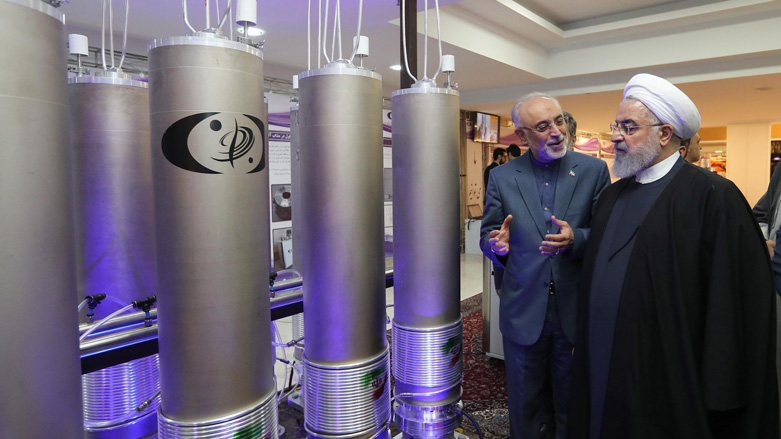US sanctions Iran’s Atomic Energy Agency

WASHINGTON DC (Kurdistan 24) – The US announced on Thursday that it was imposing new sanctions on Iran’s Atomic Energy Organization, as well as the head of the organization, Ali Akbar Salehi.
Although Salehi was born in Karbala, his parents were Iranian, and he is an Iranian national. His study of nuclear issues began during the time of the Shah, who initiated Iran’s nuclear program, when the country was aligned with the US.
Salehi, after receiving a bachelor’s degree in physics from the American University of Beirut, obtained his doctorate in 1977 in nuclear engineering from the Massachusetts Institute of Technology (MIT), one of America’s leading centers for the study of science and engineering (Salehi’s dissertation, “Resonance region neutronics of unit cells in Fast and Thermal Reactors,” can be downloaded from MIT’s website.)
Brian Hook, US Special Representative for Iran, announced the new sanctions, explaining that the Atomic Energy Organization of Iran (AEOI) “has played a big role in Iran breaching its key nuclear commitments.”
In particular, Hook emphasized the importance of the international community’s restoring an earlier goal regarding Iran’s nuclear program: that Iran not be allowed to enrich uranium. “That standard was abandoned under the [2015] Iran nuclear deal,” Hook stated, “and it needs to be restored.”
On Saturday, the AEOI announced that it had the capacity to enrich uranium to any level it wanted—although that is a violation of the nuclear deal, which imposes limits on Iran’s uranium enrichment.
Read More: Iran says has capacity to enrich uranium to any percentage
Since May 2018, when the US withdrew from the Iranian nuclear accord, it has been imposing ever tighter sanctions on Iran in an effort to force Tehran to negotiate a new, much broader agreement. A year later, in May 2019, Iran announced that it would begin reducing its commitments under the accord, and has been doing so since then.
New Humanitarian Channel
Hook also announced that the US, in concert with the government of Switzerland, had established a new framework for the shipment of humanitarian supplies to Iran which would prevent the diversion of such material for corrupt purposes.
“A few months ago, we announced that we were working with the Swiss on a new financial channel for humanitarian goods,” he said, as he explained that the US had recently “completed the sale and delivery of cancer drugs and transplant drugs to Iran.”
The Iranian regime regularly misused what was intended as humanitarian support, Hook stated. Calling the regime a “Marxist, theocratic, kleptocracy,” he said that it “has a history of using front companies disguised as humanitarian organizations” and “when food or medicine or medical devices are then processed, the regime diverts them,” using them “for the regime elite” or selling them “on the black market to raise revenue for the government.”
Hook noted that last year, the chief of staff to Iranian President Hassan Rouhani sent ministers a letter, asking them to explain the “‘disappearance’ of over one billion Euros intended for medical supplies.”
Reportedly, two million Euros meant for heart stents was spent on electrical cable, Hook said. “$180 million for medical supplies were instead spent on tobacco and cigarette paper.”
The new US channel through Switzerland is intended to ensure that the Iranian people receive the humanitarian supplies intended for them, Hook affirmed, and “we want companies to take advantage of the exemption in our sanctions regime for food, medicine, medical devices, and agricultural products.”
Editing by John J. Catherine
